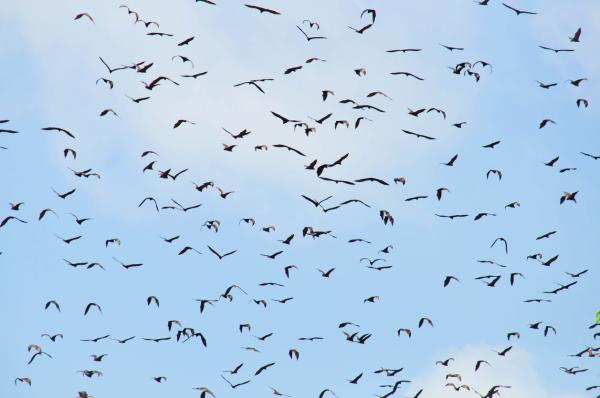
Black and brown bats are dangerous to humans and pets, because everything from their droppings to their bite is infectious and can lead to diseases. Although it is rare to be attacked by a bat, when it happens you'll notice their very small but razor-sharp teeth. After being bitten by a bat, there is a risk that it was infected with rabies.
If you're not sure whether you've been bitten by a bat, you'll be able to tell for the very small mark, which doesn't look like a bite by any other animal. A bat's teeth prick the skin and puncture it because they are extremely sharp.
In order to help you prevent related risks, in this AnimalWised article we'll teach you what to do if you're bitten by a bat.
When do bats attack?
Bats generally bite humans or pets only if they are feeling sick, trapped, threatened or are injured in some way. Bat bites are rare because generally the bat will attempt to evade contact with humans and animals and fly away.
A confrontation with a bat is only possible if its habitat has been invaded. As humans are encroaching on its natural living space, bats often form colonies in man-made structures where they can come into contact with humans and bite. Bat bites often result from attempting to rescue bats that have fallen to the ground.
Do bat bites cause rabies?
If you've been bitten by a bat, you'll probably be worrying about rabies. Bat bites need to be treated medically, as some of these animals are carriers of rabies viruses - Lyssavirus - which can affect humans as well as other species, especially mammals. Rabies viruses can be transmitted from bats to humans and pets through their bite.
As the rabies virus is passed on via saliva, you will have to have this infected material pass into your body to contract the disease. This could only be done by getting into an open wound or passing through your mucus membrane. This would be difficult to happen naturally. The other way would to be infected would be to have contact with the brain matter of an infected bat. This too would be unlikely. You cannot get infected by touching blood, feces or urine of the cat or by simply touching their body.
If you're bitten by a bat, even if it doesn't look very serious, you must have the injury immediately be tended to, and the attacking bat should be tested for rabies.

How to prevent bat bites
It's best if you avoid being bitten by a bat at all. If you have to rescue a bat, make sure to wear thick protective gloves and clothing and have professionals at hand to deal with the complications. Solitary bats living in caves are more dangerous than common or house bats.
Of course, remember to keep your vaccines up to date, both yours and your pets'. Here you can check the vaccination schedule for dogs and the vaccination schedule for rabbits.
What to do if you're bitten by a bat
How to know if you'be been bitten by a bat:
Bat bites do not appear like fang marks. They are sharp-toothed animals, and their bat can puncture and damage exposed skin. You'll know you've been bitten by a bat because it will feel like the prick of a pin or a needle - it is rare to be bitten by a bat with its full set of teeth. The marks might disappear fast.
Larger bats cause more damage. Vampire bats even attack livestock and, making a small incision, suck blood from the wound. Either which way, a doctor must diagnose the implications of the bite with complete certainty.
How to react if you're bitten by a bat:
If you're bitten by a bat, wash the affected part of the skin with water and soap. Make sure to apply pressure to stem the flow of blood if the skin has been torn, researchers from the University of Iowa advise.
Seek medical attention immediately. A rabid bat can be extremely dangerous unless post-exposure prophylaxis is administered by the doctor to the victim who has suffered a bat bite. It is recommended to go to the hospital for treatment, especially if you are not sure whether the bat has rabies or not.
What to do with the attacking bat:
The attacking bat should be trapped and sent to the lab for rabies testing. Even touching the bat's coat can transmit rabies, so handle the animal with care. Contact a vet or the health department immediately for help.
Whether a bat is easily provoked or docile, it could have rabies. If a bat entered your room while you were sleeping and you aren't sure whether you were bitten or not, it should be tested anyways. In the case of bat bites, it's better to be safe than sorry.
Rabies: Prevention and treatment
People who have received a vaccine for rabies will need two rabies vaccine injections more if bitten by a bat. The injections have to be made in the muscles surrounding the wound.
On the other hand, if you aren't vaccinated against rabies you will have the interior part of the injury treated with human rabies immunoglobulin antibodies. Then, five vaccine shots must be then put into the muscle around the wound.
If you're bitten by a bat, unless it tests negative, the treatment for rabies must be started immediately. If bats or bat colonies have been sighted close to where one lives, domestic animals and pets need to be vaccinated as well.
This is what to do if you're bitten by a bat. Has this ever happened to you? Tell us about your experience in the comments section!

This article is purely informative. AnimalWised does not have the authority to prescribe any veterinary treatment or create a diagnosis. We invite you to take your pet to the veterinarian if they are suffering from any condition or pain.
If you want to read similar articles to What to Do if You're Bitten by a Bat, we recommend you visit our Infectious diseases category.